- Bernard Preston homepage
- Herbs Spices
- Can I Make Dijon Mustard
Can I make Dijon mustard?
In reply to the question can I make Dijon mustard, thankfully the answer is an emphatic yes; at a fraction of the price and with none of the stabilizers, flavour-enhancers and preservatives that food companies so love.
The chief ingredient is elbow grease; unless you have a stone mill which I very strongly recommend by the way, not so much for mustard but for grinding corn and wheat. More likely you'll be using a mortar and pestle.
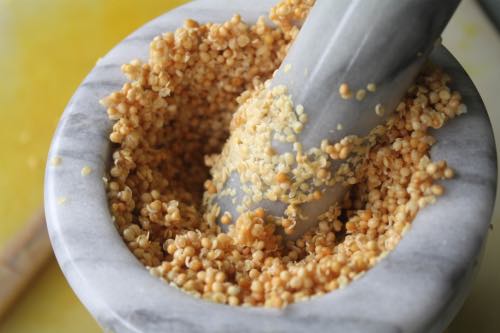 3 cups of elbow grease
3 cups of elbow greaseIngredients
- 3 cups of elbow grease
- 1 TBSP of dried mustard seeds
- 2 tsp white wine
- 4 tsp apple cider vinegar
- S&P
Go for it
- Buzz the mustard seeds very briefly in a spice mill; or coffee grinder.
- Soak the mustard seeds in 1tsp vinegar + a little water for two or more hours.
- Grind them for 5 minutes in the M&P.
- Add the wine + another 2 tsp vinegar.
- Continue to grind until it forms a mush.
- Add a touch of S&P and grind further.
- Refrigerate in a small glass bottle.
Dijon mustard is quite different to that which you'll be served with on the average hamburger; I hope you never eat hotdogs. The research is strong; avoid processed meat.
Your Dijon mustard will be intensely pungent on the tongue; you will use it in small quantities.
As always if you are going to spend time making something special, use the best ingredients. You only need very small quantities of wine and vinegar.
Classically it's not sweet though you could add half a teaspoon of raw honey. It does take the edge off the bitterness.
Some recipes call for you to discard the initial soaking liquid; then your Dijon mustard will be very bland. So food companies have to then add artificial flavouring.
Now increase the amount of mustard
You will likely find that 1 TBSP of seed goes nowhere if you fall in love with Dijon mustard as I have. So now increase the amount so that you have enough for perhaps a week.
Spend ten minutes once a week to have fresh mustard on hand; worth every second.
Fibre
For a variety of reasons most of the fibre is extracted from food bought at the grocery store. So your Dijon mustard will likely have been strained. We find that coarse-ground straight from the mortar is far more tasty, less work and good for the colon.
If your palate only tolerates food that slides down the gullet like a slice of cheesecake, then by all means strain it. But then you'll have to supplement your diet with bran and other sources of fibre. The bacteria in the gut are utterly dependent on these resistant starches that are not absorbed in the small intestine.
You could use a stick blender right at the end to get it smoother.
Honey mead vinegar Dijon mustard
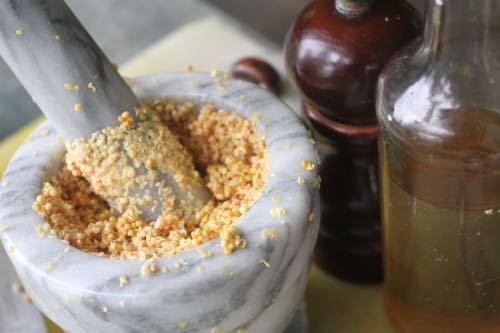
Every meader occasionally produces a brew that has gone to vinegar; it's perfect for making your Dijon mustard. Of course it is not traditional but it does produce a very delicious condiment.
This spicy peppadew mead for example can be used to make a beekeeper's variation of Dijon mustard. It is not sweet; all the sugars have been turned into alcohol and perhaps some vinegar.
Can I make Dijon mustard? Yes of course, I can; in many different ways to titillate my palate but they are all spicy and pungent. Some like it hot.
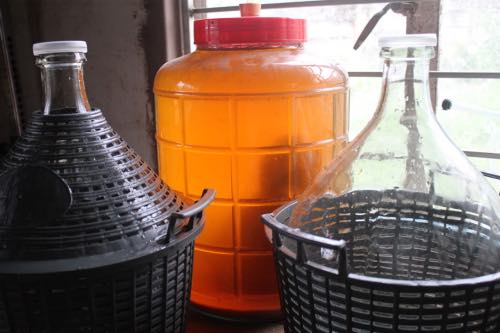 Mead can sometimes go vinegary
Mead can sometimes go vinegary23 litres of spicy peppadew mead is ready to be racked into 10L demijohns. Vinegary or not, it provides a superb wine to use when making Dijon mustard; and for sipping on a cold winter's evening.
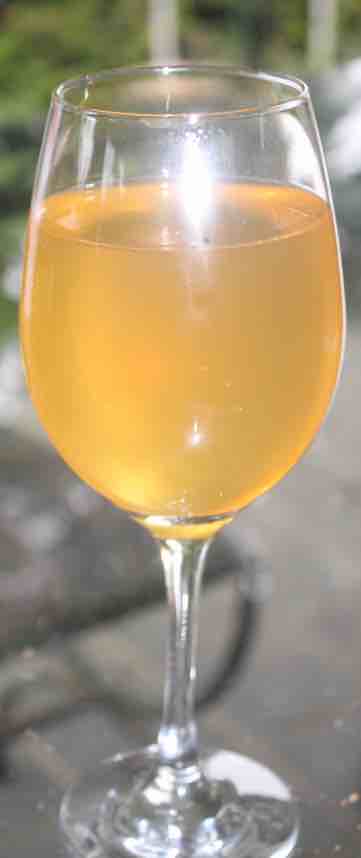
Cloudy unpasteurised mead also makes an excellent probiotic, rich in friendly yeast cells that help overcome the pathogens like Candida albicans.
Vinegar
Perhaps you use a high quality vinegar to preserve other foods like beets; and are reluctant to dump the liquid when the jar is empty. Try it when you make your Dijon mustard.
Avoid spirit vinegar; just another chemical you can do without.
Nutrition of Dijon mustard
One is enjoying only small quantities so the nutrition of Dijon mustard will make just a minor contribution to wellness. Nevertheless the seed contains an impressive number of minerals like iron, calcium and selenium; minor amounts of amino acids and the so-important omega 3, ALA.
Junk
Commercial Dijon mustard usually contains preservatives such as sulphur dioxide and citric-acid; and strangely various flavourings.
Often you will find that the manufacturer has added a stabilizer or emulsifier; scary chemicals.
It's speculative but there are some who think it is the sulphites used to preserve commercial wines that make them carcinogenic.
It is usually presumed to be the alcohol in the wine but that is being questioned. Blue Zone folk drink plenty of natural brews daily with their meals yet enjoy very long, healthy lives.
Price
100 grams of mustard seeds in South Africa costs R12; that converts into about 3 USD per pound.
I used 20 grams in the photos above; R2.40. The wine and vinegar come to very little; perhaps R5.00 in all to make about 60g of Dijon mustard. That is enough for a week; a pittance. That's one quarter of the retail price; with none of the noxious chemicals.
Can I make Dijon mustard?
Can I make Dijon mustard. Yes, I certainly can; and there are all sorts of variations to keep one from getting bored.
The time is well spent for those anxious about the chemicals food companies love to add to their products; about ten minutes every week or month, depending on how much you grow to appreciate homemade Dijon mustard.
Those who used to enjoy Colman's but find it so expensive will be very pleasantly surprised with their homemade Dijon mustard; it is far tastier in my opinion.
On a hamburger today it was simply divine. Often I will enjoy it on artisan bread with feta cheese. Make sure you brush and floss your teeth carefully after the meal; the fragments get stuck between the molars.
Could I grow my own mustard seed?
Given the very low cost of mustard seed one has to ask if it is worth the effort planting some in the garden. I will try this coming summer; we are making a concerted effort to eat only organic food.
I have absolutely no idea from where this at the grocery store came; or under what conditions it was grown.
We have an awful lot of cancer in our family; I would rather spend the hours growing and preparing organic food than even more consulting oncologists. Not to mention dying in total misery 10 or more years before my time; life is good.
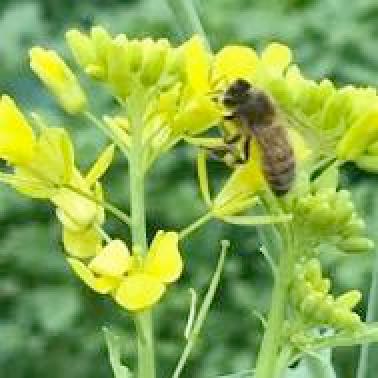
The bees in our hives will be pleased with the mustard too; the flowers are a rich source of both pollen and nectar.
Both the leaves and flowers add flavour to an otherwise uninteresting green salad too.
When browsing use right click and "Open Link in New Tab" or you may get a bad gateway signal.
Newsletter
Our newsletter is entitled "create a cyan zone" at your home, preserving both yourself and Mother Earth for future generations; and the family too, of course. We promise not to spam you with daily emails promoting various products. You may get an occasional nudge to buy one of my books.
Here are the back issues.
- Lifestyle and ideal body weight
- What are ultra-processed foods?
- Investing in long-term health
- Diseases from plastic exposure
- Intensive lifestyle management for obesity has limited value
- A world largely devoid of Parkinson's Disease
- The impact of friendly bacteria in the tum on the prevention of cancer
- There's a hole in the bucket
- Everyone is talking about weight loss drugs
- Pull the sweet tooth
- If you suffer from heartburn plant a susu
- Refined maize meal and stunting
- Should agriculture and industry get priority for water and electricity?
- Nature is calling
- Mill your own flour
- Bake your own sourdough bread
- Microplastics from our water
- Alternative types of water storage
- Wear your clothes out
- Comfort foods
- Create a bee-friendly environment
- Go to bed slightly hungry
- Keep bees
- Blue zone folk are religious
- Reduce plastic waste
- Family is important
- What can go in compost?
- Grow broad beans for longevity
- Harvest and store sunshine
- Blue zone exercise
- Harvest and store your rainwater
- Create a cyan zone at your home
Did you find this page interesting? How about forwarding it to a friendly book or food junkie? Better still, a social media tick would help.
- Bernard Preston homepage
- Herbs Spices
- Can I Make Dijon Mustard
Address:
56 Groenekloof Rd,
Hilton, KZN
South Africa
Website:
https://www.bernard-preston.com